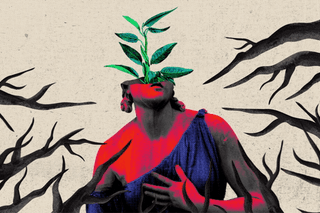
How Shaming Women for Their Choices Breeds Lifelong Self‑Doubt
Breaking away from the cycle of shame and self-doubt – without succumbing to the demands of patriarchy – isn’t easy.

“There’s such an overabundance of shame reserved for women. If she terminates, shame. She keeps the baby, shame. She loses the baby, shame. Can’t conceive, shame. Has only one [child], shame. Has many, shame. Leaves baby with [a] caregiver to [go to] work, shame. Doesn’t work to care for [the] baby, shame,” reads a tweet by @Gbemisoke.
Women have historically been shamed for virtually everything — for having body hair, for shaving off said body hair; for being too tall, too short, too skinny, too fat; for using tampons, for using pads, for reaching puberty too early, for not reaching puberty early enough; for wearing make-up, for not wearing make-up; for being too shy, for talking too much… The list is endless. One article calls it the “heredity of shame” that women inherit.
Women continue to be shamed because it works — shaming leads to women doubting themselves more often than not because the messages used to shame women are often rooted in patriarchal norms that we’ve been socially conditioned to adhere to. “…we feel the need to conform to these norms… because we have grown up believing in these. There is neuroscience research that talks about the powerful connection between experiences, narratives, and memory,” Anindita Kundu, a psychotherapist from Bengaluru, explains.
“Growing up with shame-induced negative perceptions of oneself can become an internal reality [that] follow[s] us into adulthood,” explains psychotherapist Neil Brown. Talking about a patient who was shamed since childhood, Brown adds, “And like other [people] who are shame-based, she now lives with self-doubt.”
The self-doubt that is spawned by perpetual shaming makes it easy for society to gaslight women into feeling guilty for standing up for themselves. When Neha, 38, found out her husband was cheating on her, people tried to convince her it was her fault. “I was told, ‘If you decide to work, what option does your husband have?'” She says that when she first found out about the adultery, “for a while, I questioned my looks, my being — because I started believing that I am someone who men will cheat on.”
Making women doubt every decision they make can manifest as a constant battle in their minds, which can distort their sense of self-worth, in the long run. And when one is constantly shamed for every omission and commission, their self-confidence takes a beating, making it easier for them to be “tamed” and “controlled.” The shaming, then, becomes an indirect tool to prevent women from protesting against systemic inequalities. And thus, consistently shaming women works in the patriarchy’s favor.
Related on The Swaddle:
How Social Shaming Feeds Survivors’ Emotional Dependence on Their Abusers
Brené Brown, a research professor at the University of Houston, notes that “vulnerability is at the “core of shame.” Having interviewed her, journalist Andy Hinds wrote in The Atlantic, “For women… there are whole constellations of often contradictory expectations that, if not met, are sources of shame. But for men, the overarching message is that any weakness is shameful. And since vulnerability is often perceived as weakness, it is especially risky for men to practice vulnerability.” That’s why Brown believes, “messages of shame are organized around gender.”
Women’s propensity to feel shame could also stem in part from them being conditioned to be people pleasers from a very young age. “Young girls are told to be quiet and pleasant, to be orientated towards others, to not speak up for what they want, and to please others. These gender-based stereotypes are continuously reinforced in our society in a manner that distinctly disadvantages women,” notes psychologist Teyhou Smyth.
Battling against the double whammy of conditioning and reinforcements, many women find themselves rudderlessly navigating the unkind terrain of self-doubt. Research suggests that, compared to men, women feel humiliated far more quickly and are also more prone to the negative effects of shame — like poor self-esteem.
“‘Am I not enough?’ remains a perpetual question that most women struggle with,” notes Kundu. Years of social conditioning and gaslighting can lead one to doubt whether they’re a “good” when they’ve always been told that to be a “good” one must be docile, giving, and all-accommodating without a hint of any opinion.
Giving in to the constant shaming by conforming to society’s expectations, keeps women trapped in the status quo of patriarchy and impacts their mental health. As psychotherapist Gavin Sharpe explains, “[T]he more time I spend meeting your needs, the less time I spend meeting mine,” which can, in the long run, lead to resentment and anger. And since expressing anger isn’t particularly “pleasant” behavior either, it stays suppressed, making way for passive-aggressive behavior, and in extreme cases, a psychological breakdown, Sharpe warns.
The alternative — protesting the social conditioning one has grown up with — can also lead one to a crisis of belonging. Experts note that human beings tend to have an innate emotional need to belong, or be “affiliate[d] with and be accepted by members of a group.” And without a sense of belonging, people can feel lost and alone, resulting in stress and depression.
When Neha finally decided to divorce her husband, she was told by many that “women who stay alone are never accepted by society.”
Related on The Swaddle:
How Being Guilt‑Tripped by Parents, Partners Can Leave Long‑Term Mental Scars
According to Kundu, watching one’s parents and contemporaries fulfill socially prescribed gender roles — while trying to break away from them without “blueprints to navigate the narratives of shame” — can lead one to feel overwhelmed and lost. Moreover, as a result of living with the constant guilt of non-conforming — even for something as small as taking a nap when tired — women also tend to burn out a lot sooner than men do, they add.
Further, “when we move away from the normative identity that the society has conditioned us into adhering to, it becomes harder to be closer to our chosen identity,” Kundu explains, noting that many of her female clients — especially those simultaneously managing childcare and a career — report “being perpetually exhausted, lacking meaning, and feeling depressed.” In existentialism, this is called noogenic neurosis — a form of neurosis resulting from existential frustration. It often sets in when we feel dissociated from our own bodies. According to the American Psychological Association, it can stem from the “definition of self as nothing more than an embodiment of biological needs and a player of social role,” leading the neurosis to manifest as “chronic meaninglessness, apathy, and aimlessness.”
Although breaking away from this cycle of shame and self-doubt is far from easy, all hope is not lost. Experts believe that people’s propensity to feel shame reduces as they reach middle age. With age, Pooja, 42 — who used to constantly “second-guess” herself for things as trivial as not fussing over her friend’s children, not dying her hair, and refusing to spend time with relatives she didn’t get along with — was able to overcome the guilt and prioritize her individual needs better. But time can’t be the only solution to patriarchal expectations — by middle age, many people have already made important life decisions motivated by shame.
Often, it is the absence of social support that allows social conditioning to triumph, according to Kundu. They say, “What makes the inward battle harder is having an unsupportive environment around us… A supportive environment helps figure out a constructive way to better the relationship with the self rather than sinking into the shame.”
In the absence of social support from friends and family, therapy can help one cope with the persistent self-doubt shaming results in. “I teach my clients to question curiously and compassionately what each of our ideologies that we prescribe to mean for us. This is also where I teach them the use of the ‘and’ language [to address the notion that they ‘aren’t enough’] — to help them question and hold contradictory narratives about themselves.” Explaining how that works, Kundu explains, “I can be a caring and available mother and want to have a full-time career at the same time. I can be a feminist and still want to get married or choose to be a housewife. It doesn’t make me bad, doesn’t make me not enough.”
“It’s extremely important to recognize that none of us are above social conditionings; no matter how much we would like to believe that it doesn’t impact us, it does. So, acknowledging that with kindness and curiosity towards ourselves can go a long way.”
Devrupa Rakshit is an Associate Editor at The Swaddle. She is a lawyer by education, a poet by accident, a painter by shaukh, and autistic by birth. You can find her on Instagram @devruparakshit.
Related


The Merits — and Demerits — of Side Character Energy
